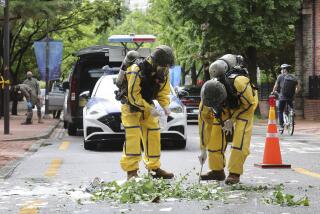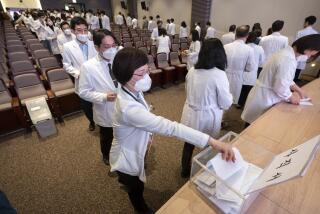For S. Korean actor, democracy brings new roles
SEOUL — Park Yong-shik is as bald now as he was 27 years ago when he was one of South Korea’s most popular television actors, playing bad guys and funny guys, from shoemakers to Buddhist monks.
He was 34 and enjoying the best years of his career when Gen. Chun Doo-hwan came to power in a military coup, rigged an election to become president and, among other autocratic acts, made it clear that the actor who looked a lot like him would never again be seen on TV.
“I remember the first time he appeared on television, my friends said to me: ‘Hey, that guy looks exactly like you,’ ” says Park, recalling the period in late 1979 when Chun began maneuvering to usurp civilian control. “I told them: ‘No, he’s only bald like me.’
“He was 15 years older. But on TV, we looked the same.”
Park would not get another acting job until 1988, not until Chun’s presidency crashed on the anvil of violent pro-democracy demonstrations that demanded the release of thousands of dissidents and the right to directly elect the president. On Wednesday, South Koreans will go to the polls to choose among 11 contenders in a rollicking atmosphere in which presidents and their putative successors are often brutally mocked but seldom feared.
“Back then, you had a person who was intentionally made into a god, deified to make him stand out more,” Park says. “Now, it’s the total opposite. Sometimes freedom can seem so disorderly and chaotic that I wonder if we have too much. There is no holy place you cannot touch.”
At times, trash talk seems to be the prime currency of South Korean political discourse. Rude. Colorful. Hyperbolic.
Outgoing President Roh Moo-hyun has been a lightning rod for abuse, with attacks coming from both his ideological enemies in conservative circles and from liberals who feel betrayed by what they see as his failures.
In a typical attack, the main opposition Grand National Party (GNP) accused Roh this year of “suffering from delusions of grandeur and narcissism” and declared: “We’re seriously concerned about the president’s mental health.”
Roh has dished the insults right back, suggesting in a highly controversial June speech that “politics and the media are among the nation’s most backward sectors.”
In 2003, his governing liberal Uri Party tried to pass a law that would have limited the market share that could be controlled by a media company, which was widely seen as an attempt to curb the power of the three largest conservative media groups. The effort failed, but Roh has continued to attack conservative media companies.
“Democracy is very young in Korea and the political language is very hard and very rude,” says Cho Gab-je, a former newspaper publisher and prominent conservative journalist, who adds that Roh’s leftist politics could “sometimes be described as a kind of treason.”
Some Koreans see this willingness to speak whatever’s on your mind to those in power as a sign of democracy’s robust health, with Koreans no longer intimidated by the “emperor presidency” of old, Cho says. “Of course, the standard of reporting in the Korean press is too low. But there is competition in the media, and this will improve politics. Our behavior has not gone too far.”
Still, some argue that a measure of restraint is badly needed.
“On the surface, it seems there’s more freedom, but there’s no maturity to the debate,” says Hong Se-hwa, an editor at the liberal Hankyoreh newspaper. “On the Internet, all the attacks on each other make me worry our democracy might stop here and regress.”
Hong also argues that Roh’s shoot-from-the-hip style has diminished the aura of the presidency, a surprising comment from someone who, as a student, was hounded by the last military dictatorship into an exile that lasted 23 years.
“A president does need to maintain some level of authority, but Roh has lowered the dignity of the office,” he says. “There is a difference between authority and authoritarianism, and there’s a part of the job that requires authority.”
Yet no matter how messy democracy may be at times, few would want to do without it.
“A person’s life was worth less than a fly’s back then,” says Park, whose acting career ceased after Chun consolidated control over the national media.
Park remembers those days when a president’s vanity blackballed him as “the darkest time in my life.” Directors suggested he do radio work. Friends told him to buy a wig.
He ran a mill instead, grinding sesame seeds and red peppers into oils. His wife wanted to move to the U.S., but he was too stubborn to leave, he says.
“Acting was the only thing that mattered in my life. . . . I told my wife: ‘He claims he’ll only rule for one term, and then I’ll only be in my 40s.’ ”
Park was back acting almost as soon as Chun left office in disgrace (tried for treason by a democratic government in 1995, he was condemned to death, though the sentence was later commuted).
Park has since agreed to play his nemesis in TV dramas and movies “about 10 times,” he says. The two even met after Chun called one day in 1991 and said he’d like to apologize.
“Oh, yes,” he laughs when asked if they resembled each other after all. “My nose. My eyes. My baldness.”
“I might be the only man on Earth to have had this experience,” Park says. “It could never happen today. There’s so much freedom that it’s the president who feels uncomfortable.
“There are many things we gained with freedom,” he says. “And also things we have lost.”
--
More to Read
Sign up for Essential California
The most important California stories and recommendations in your inbox every morning.
You may occasionally receive promotional content from the Los Angeles Times.










